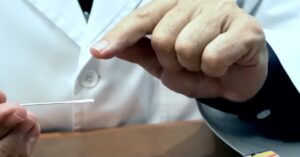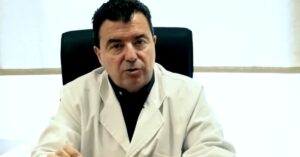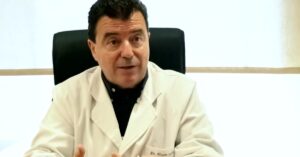
Talking about the Human Papillomavirus (HPV) isn’t easy, mainly because it’s surrounded by doubts, fears, and myths. However, it’s a topic that deserves attention, as it’s one of the most common sexually transmitted infections in the world. Many people live with the virus without knowing it because, in many cases, it doesn’t present any visible symptoms. And that’s precisely the problem: its silence. When it’s not detected early or given the importance it deserves, it can become complicated and pose a health risk.
The first thing we need to understand is that having HPV is not synonymous with an immediate or serious problem. In fact, most people who contract the virus clear it naturally thanks to their immune system. But when this doesn’t happen, the virus can remain active and cause genital warts, skin lesions, and even increase the risk of developing certain types of cancer. That’s why it’s crucial to be aware of it, recognize its signs, and act responsibly.
IMPORTANT: The video related to this story can be found at the end of the article.
So, what exactly is HPV? It’s a group of viruses that includes more than 150 different types. Some are considered low-risk because they only cause warts, while others, known as high-risk, can cause cell changes that over time can lead to cervical, anal, penile, throat, or vulvar cancer. The truth is, it’s much more common than you might think: millions of people have it and don’t even know it because they’ve never experienced any symptoms.
How is HPV transmitted?
The main route of transmission is sexual contact, whether vaginal, anal, or oral. Complete penetration is not necessary for transmission to occur; skin-to-skin contact in the genital area is sufficient. It can also be transmitted from mother to child during childbirth, although this is less common. It’s important to note that condoms reduce the risk, but do not eliminate it completely, as the virus can be present in areas not covered by the condom.
Most common symptoms
Here’s where it gets tricky: in most cases, HPV doesn’t cause any symptoms. A person can have the virus for years and not notice it. However, when symptoms do appear, they mainly manifest in two ways:
- Genital warts or warts on other parts of the body: these usually appear as small bumps in the genital area, around the anus, or even in the mouth if transmitted through oral sex. They can be solitary or clustered, flat or raised, and are not always painful, but they can be uncomfortable.
- Precancerous or cancerous lesions: at this point, the virus causes cellular changes that, over time, can develop into cancer. In women, the most common type is cervical cancer, which can be detected with tests such as the Pap smear.
In addition to this, some people with high-risk HPV may experience indirect symptoms such as bleeding after sexual intercourse, discomfort when urinating, pelvic pain, or changes in vaginal discharge.
Is HPV curable?
Here’s where we need to be clear: there is no medication that completely eliminates the virus from the body. What does happen in most cases is that the immune system manages to control and naturally eliminate it within 1 to 2 years. Therefore, most current treatments focus on addressing visible symptoms, such as warts or lesions, and on strengthening the immune system so the body has better defenses.
Natural remedies that can help:
While no home remedy will immediately “kill” the virus, many can support and strengthen the immune system, improving the body’s ability to fight it. Among the best known are:
- Raw garlic: Considered a natural antibiotic, garlic has antiviral properties and can help fight infections. Consuming it regularly, either with food or on an empty stomach, is a simple yet powerful aid.
- Green tea: its antioxidants help fight inflammation and there are studies that suggest benefits in reducing warts caused by HPV.
- Turmeric: This spice is famous for its anti-inflammatory and antioxidant properties, making it an ally for maintaining a strong immune system.
- Castor oil or tea tree oil: used topically, they have traditionally been used to reduce skin warts, although it is always advisable to consult a doctor first.
- Balanced diet: Beyond specific products, maintaining a diet rich in fruits, vegetables, lean proteins and whole grains makes a big difference in the body’s ability to fight the virus.

Factors that weaken the immune system:
Stress, lack of sleep, excessive alcohol consumption, smoking, and a poor diet are direct enemies of the immune system. When our defenses are low, HPV has an easier time remaining active in the body. Therefore, a healthy lifestyle is as important as any medical treatment or natural remedy.
Prevention: The Most Powerful Key
While it’s true that anyone can contract HPV, it’s also true that there are tools to minimize that risk. One of the most important is vaccination. The HPV vaccine is available in many countries and protects against the most dangerous types of the virus, especially those associated with cervical cancer. Ideally, it should be administered during adolescence, before becoming sexually active, but it can also be given to adults.

In addition to the vaccine, using a condom in every sexual encounter, getting regular checkups, and maintaining open communication with your partner are fundamental pillars in prevention.
The Emotional Impact of HPV:
We mustn’t forget the psychological aspect. Receiving an HPV diagnosis can generate anxiety, fear, and even shame. But it’s important to understand that it’s not the end of the world or a reason for stigma. As we’ve already mentioned, most people will have it at some point in their lives and will clear it without major complications. Talking about it, getting informed, and seeking emotional support are key steps to facing the situation maturely.

What you shouldn’t do
- Don’t ignore visible symptoms. If warts or unusual bleeding appear, see a doctor.
- Do not attempt to self-medicate or apply harsh home remedies without supervision, as you could cause further harm.
- Don’t blame yourself or your partner. HPV can remain hidden for years, so it’s almost impossible to know when the infection occurred.

In conclusion,
HPV is a very common virus; so common, in fact, that millions of people live with it without knowing it. The good news is that in most cases, the body itself controls and eliminates it. Even so, we shouldn’t be complacent: prevention, early detection, and taking care of the immune system are essential. Natural remedies can be a valuable support, but they should never replace medical guidance.
The key is to stay calm, act responsibly, and take care of both your body and mind. Knowledge is power, and when we understand what we’re facing, it’s easier to make sound decisions to protect our health.